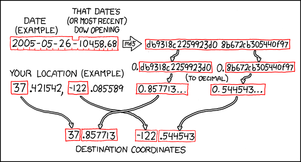Difference between revisions of "The Algorithm"
From Geohashing
imported>Tjtrumpet2323 |
imported>Tjtrumpet2323 (Adding Template:30w until I can work out how to put this into words.) |
||
| Line 1: | Line 1: | ||
| + | {{30w}} | ||
| + | |||
[[Image:Coordinates.png|thumb|301 px|The Algorithm]] | [[Image:Coordinates.png|thumb|301 px|The Algorithm]] | ||
Revision as of 04:29, 24 May 2008
This time, we did invent the algorithm!
- Strings of the current date (in yyyy-mm-dd format) and the daily opening price of the Dow Jones Industrial Average are concatenated, with a hyphen separating the two.
- If there is no opening price for the Dow, the opening price from its previous day of active trading is used instead.
- The resulting string is then fed through the well-documented MD5 cryptographic algorithm to generate as pseudo-random (yet easily verifiable) "hash" of 32 hexadecimal digits.
- The "hash" is then split into two halves of 16 hexadecimal digits each.
- Each half of the "hash" is prepended with a decimal point (so as to represent a hexadecimal fraction) and is converted to a base-10 fraction.
- The resulting decimal fractions are appended to the integral (lat,lon) values of any given graticule to produce that graticule's geohash target for the day.
Fractional hexadecimal to decimal calculation
Many online hex-to-dec converters do not support hexadecimal fractions. Here is one that does:
